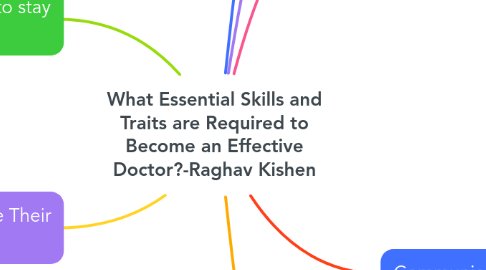
1. Confidence and the ability to stay calm
1.1. Doctors must be calm and confident in their team and themselves in order to maintain patient trust, improve motivation and do things in a methodical and organised manner
1.1.1. This can help them deal with uncertainty, smooth over tensions and reduce stress in their work environment.
2. The Ability to Manage Their Health
2.1. Doctors, especially those working in A&E and other intensive wards, are prone to not taking care of their mental and physical health due to long work hours, a lack of nutrition as sometimes they have to skip meals and stress and anxiety.
2.1.1. Hence, Doctors must be able to manage their own mental and physical health e.g through: therapy, exercise and meditation, in order to maintain quality patient care and reduce their own stress and anxiety which can influence their work.
3. Empathy
3.1. Knowing how to communicate with your patients and effectively conveying information in an effective, empathetic manner helps both the doctor and patient better understand the underlying condition.
3.1.1. This is effective in improving patient prognosis and satisfaction by lowering patient anxiety and helping them feel more comfortable with sharing their thoughts and feelings and being honest.
3.1.1.1. Doctors must also consider the financial status of their patients before prescribing expensive tests and treatment.
4. A Long Term Learner
4.1. Doctors must keep up to date with the newest conditions, diseases and forms of treatment in order to provide quality treatment for their patients.
4.1.1. They must also be able to handle failure and learn from their mistakes to improve on their practise.
5. Critical Thinking
5.1. Doctors need to make decisions by analysing all the variables and choosing the correct course of action.
5.1.1. Sometimes new situations may appear that may require you to think quickly and decisively while staying calm and confident.
6. Communication
6.1. Knowing how to communicate with your patients and effectively conveying information in an empathetic manner helps both the doctor and patient better understand the underlying condition.
6.1.1. Helping the patient understand his/her condition also helps reduce stigma, making the patient feel comfortable and trusting.
6.1.1.1. This removal of stigma will also have long term, high ranging impact on society as people will be able to trust doctors more easily and explain their problems and hence get a more personalised and effective treatment method and advise that may reduce their need of visiting the hospital again and may consequentially reduce the burden on healthcare and improve public health.
6.2. Good communication also helps with streamlining and coordinating team work between departments and multi disciplinary teams.
6.2.1. This means that work can proceed faster and members can also voice their opinions-allowing for better treatment and hence a better patient prognosis at the end of the day.
